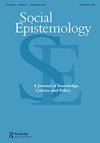Enhanced Epistemic Trust and the Value-Free Ideal as a Social Indicator of Trust
IF 2
2区 哲学
Q1 HISTORY & PHILOSOPHY OF SCIENCE
引用次数: 0
Abstract
ABSTRACT Publics trust experts for personal and pro-social reasons. Scientists are among the experts publics trust most, and so, epistemic trust is routinely afforded to them. The call for epistemic trust to be more socially situated in order to account for the impact of science on society and public welfare is at the forefront of enhanced epistemic trust. I argue that the value-free ideal for science challenges establishing enhanced epistemic trust by preventing the inclusion of non-epistemic values throughout the evaluation of evidence and communication of these values. By selectively silencing non-epistemic values, the ideal cannot take into account publics’ social and moral responses to inductive risk, which are instrumental for defining and determining public welfare. Furthermore, by emphasising epistemic values almost exclusively in science education and communication, the value-free ideal is presented to publics in such a way that it becomes a social indicator of trust. I show this through examination of the importance of values in decisions to trust, and conclude that values (and restrictions on them) can be used by lay publics to help decide which experts to trust.增强的认知信任与价值自由理想作为信任的社会指标
公众出于个人和亲社会的原因信任专家。科学家是公众最信任的专家之一,因此,常识上的信任通常给予他们。为了解释科学对社会和公共福利的影响,对认知信任的呼吁更加社会化,这是增强认知信任的最前沿。我认为,科学的无价值理想通过防止在整个证据评估和这些价值观的交流中包含非认知价值观来挑战建立增强的认知信任。通过选择性地压制非认知价值,理想不能考虑公众对归纳风险的社会和道德反应,而归纳风险是定义和决定公共福利的工具。此外,通过几乎完全在科学教育和传播中强调知识价值,价值自由的理想以这样一种方式呈现给公众,使其成为信任的社会指标。我通过考察价值观在信任决策中的重要性来证明这一点,并得出结论:价值观(以及对价值观的限制)可以被外行公众用来帮助决定信任哪些专家。
本文章由计算机程序翻译,如有差异,请以英文原文为准。
求助全文
约1分钟内获得全文
求助全文
来源期刊

Social Epistemology
Multiple-
CiteScore
2.60
自引率
17.60%
发文量
60
期刊介绍:
Social Epistemology provides a forum for philosophical and social scientific enquiry that incorporates the work of scholars from a variety of disciplines who share a concern with the production, assessment and validation of knowledge. The journal covers both empirical research into the origination and transmission of knowledge and normative considerations which arise as such research is implemented, serving as a guide for directing contemporary knowledge enterprises. Social Epistemology publishes "exchanges" which are the collective product of several contributors and take the form of critical syntheses, open peer commentaries interviews, applications, provocations, reviews and responses
 求助内容:
求助内容: 应助结果提醒方式:
应助结果提醒方式:


